Is Turkey in Europe? A Look Inside the Desired Turkish Bid for EU Membership

The Art of Living in Turkey contains affiliate links and is a member of the Amazon Services LLC Associates Program. If you make a purchase using one of these Amazon links, I may receive compensation at no extra cost to you. See my Disclaimers for more information.
Are you curious whether Turkey is in Europe or Asia? You’re in the right place!
It can feel a little embarrassing when you’re unsure about something you think you should know, especially with such a popular travel destination as Turkey.
But don’t worry—you’re not alone! After years of living here, I’ve come to appreciate this fascinating blend of continents, and I think you will too.
Turkey is truly unique, straddling both Europe and Asia, and stands at the crossroads of ancient civilizations. With a history spanning thousands of years, it offers travelers an incredibly rich heritage to explore.
Yet one question always seems to come up: is Turkey in Europe, Asia, or both?
The answer is somewhere in between. While Turkey’s geography spans both continents, politically and culturally, its relationship with Europe has been a strong one for nearly a century.
Since 1923, when Turkey joined the League of Nations, it has maintained close ties with European countries.
Although not an official EU member, Turkey has long cooperated with European institutions, and Turkish citizens even enjoy visa-free travel to many EU countries.
Let’s jump in and take a closer look.
Is Turkey in Asia? Is Turkey in Europe?
This is a very popular question and for a valid reason.
If you look at the map below, you can see in the top left corner that there is a very small portion of Turkey that is on the European side and most of it remains in Asia.
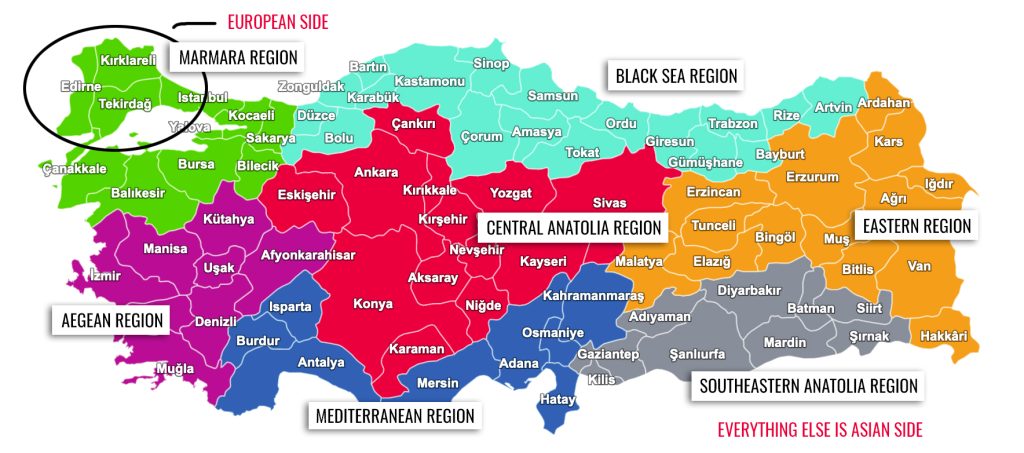
According to the geography of Turkey, it is more Asian than European but depending on where you are you will get an entirely different feel of culture.
Is Turkey an EU Member?
The current answer is no, Turkey is not a member of the EU. Turkey first applied decades ago and has worked on it through the years.
During the EU accession talks, not all of the 35 policy chapters have been opened and worked through, which is something that has to be done before approval is given.
In 2018, the EU’s General Affairs Council noted that
Turkey has been moving further away from the EU. Turkey’s accession negotiations have therefore effectively come to a standstill and no further chapters can be considered for opening or closing and no further work towards the modernization of the EU-Turkey Customs Union is foreseen.
Peter Michael – Cyprus Mail
That being said, it is important to note that although Turkey is not an EU member, it is a member of NATO.
General Info about Turkey*
* Britannica Website for details
| Official Name: Republic of Turkey, Türkiye (Turkey’s new name) | Units of Measure: Celsius (°C), meter (m), liter (L) |
| Time Zone: GMT+3. This is 2 hours ahead of London (GMT +2). Turkey does not observe daylight savings time. | Location: It is located in Southeastern Europe and Southwestern Asia. The portion within Europe is considerably smaller in size. |
| President: Recep Tayyip Erdogan (2014-present) previously served as Prime Minister of Turkey from 2003 until 2014. | Capital: Ankara (it was moved from Istanbul when Mustafa Kemal Ataturk established the republic) |
| Religion: 99.8% of the population is registered as Muslim (mostly Sunni) | Country Code: +90 Language: Turkish Currency: Turkish Lira |
| Religion: 99.8% of the population is registered as Muslim (mostly Sunni) | Population: 84,680,273 in 2021 (second highest population in Europe) |
| Landscape: The topography of Turkey is quite vast including plateaus, plains, mountains, beaches, and all that is in between. Turkey also holds the Euphrates and Tigris rivers. While the European part is made up mostly of the Eastern Thrace plan and the Strandzha mountain, the Asian part has many mountain ranges. One of the most beautiful things is the mountains that run alongside the most stunning beaches. | Weather: This varies greatly depending on where you are in the country. If you want a deeper look you can check out the 7 Regions of Turkey for more information. The winters are generally cold and wet whereas the summers are hot and dry. You will also find the coastal regions have much higher humidity, making the temperatures feel more extreme in both directions. |
| Size: 783,562 sq km (302,535 sq mi). 755,688 sq km (291,773 sq mi) are in Asia and 23,764 sq km (9,175 sq mi) are in Europe. | Emergency Numbers: by dialing 112 you will be able to be connected though English will likely not be spoken. |
Turkish Language

The Turkish language was changed from a Perso-Arabic script to a Latin-based alphabet by Mustafa Kemal during the establishment of the Republic of Turkey in 1928.
It belongs to the same linguistic family as Finnish and Hungarian and for native English speakers it is rated as a level 4 language.
While it is a very difficult language to learn, there are many redeeming factors. One of my favorite things about Turkish is that it is phonetic which means that every letter always says the same sound. It makes for easy reading.
When I first moved to Turkey, every day as I rode into the city for language lessons, I would read all the signs to myself. It was so fun to be able to read right away even if I didn’t know what the heck I was saying.
Another great thing about Turkish is that there aren’t so many exceptions as there are in English. The grammar is hard but straightforward.
If you are planning to visit, you can check out Turkish for tourists and learn some basic phrases before go!
Interesting facts about Türkİye
- Noah’s Ark – Many Christians believe that Mount Ararat is where Noah’s Ark landed after the flood. Though there have been many expeditions, the remains have yet to be found.
- Name Change – in 2022, Turkey officially changed its name to Türkiye in order to get away from negative stereotypes of the bird with the same name.
- Transcontinental – Turkiye is one of the 4 transcontinental countries in Europe. The others are Russia, Egypt, and Kazakhstan,
- Istanbul is one of a kind – Istanbul is the only major city in the world that is located on two continents. It also used to be called Constantinople.
- 100 Years – 29 October 1923 marked the 100th anniversary of Türkiye becoming the Republic of Türkiye. That means they have been around for an entire century now!
- The Original OG – The story of Santa Claus originates in Türkiye with a monk named St. Nicholas who was born in Patara in 280 AD.
- Fez is Outlawed – it’s actually illegal to wear a fez in Türkiye. Atatürk made the “Hat Law” in 1925 which banned the fez, a symbol of the Ottoman Empire, and this law has never officially been overturned.
- UNESCO Sites – Türkiye has 19 properties inscribed on the UNESCO World Heritage List and another 84 properties on the Tentative List.

The basics of Türkİye
Food & Drinks
Food and drinks are an important part of Turkish culture. While there are well-known drinks like Turkish Coffee and perhaps Tea, there is also Ayran, Raki, and Sahlep to name just a few.
There are also a plethora of foods to try while you’re here. You can check out more about Turkish foods, drinks, and desserts in these blog posts.
That being said, they use a lot of red pepper flakes (though typically mild), cumin, mint, paprika, and thyme.
The most popular methods of cooking are grilling and roasting though you will see all the others as well.
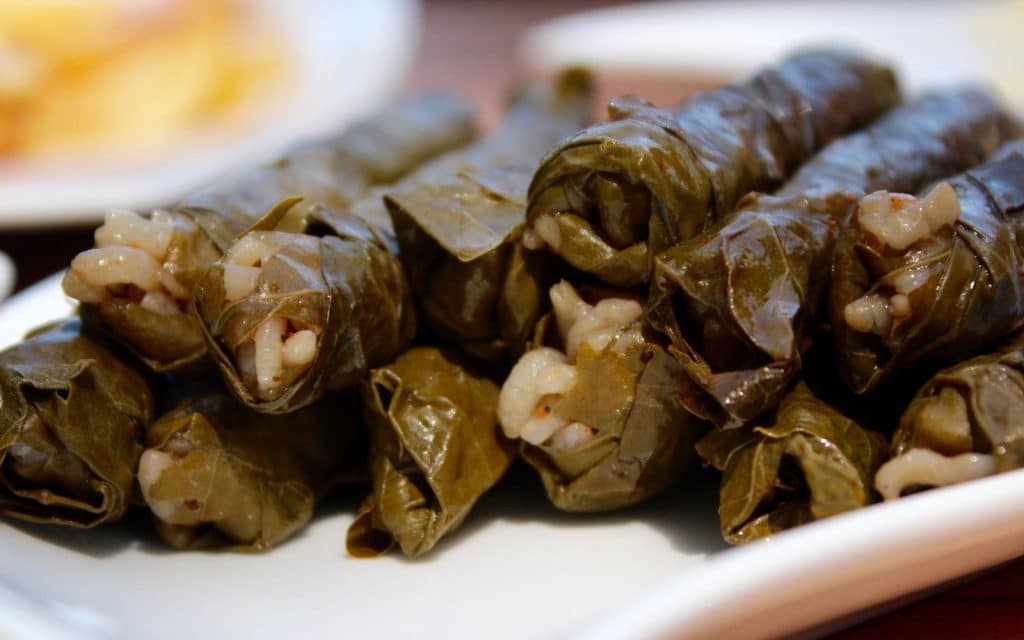
They also do a lot of veggies. Things like eggplant, onions, tomatoes, cucumbers, potatoes, leeks, and peppers.
They will often combine the veggies with meat (typically chicken or beef) and rice or bread.
In addition to that, they have so many delicious snacky type things like gözleme (similar to a quesadilla), börek (a savory pastry filled with cheese, veggies, and/or meat), and simit (a Turkish bagel essentially).
Money
If you’re planning a trip to Turkey, it’s important to understand the currency – the Turkish lira.
The lira is used for all transactions in Turkey and is an essential part of your travel experience.
It can be confusing for travelers who are not familiar with the currency, so it’s helpful to know a few basics before you go.
The Turkish Lira is made up of coins and notes that vary in size and denomination depending on their value.
Coins come in 5, 10, 25, 50, and 100 kuruş denominations while paper money comes in larger denominations such as 5, 10, 20, 50, 100, and 200 liras.
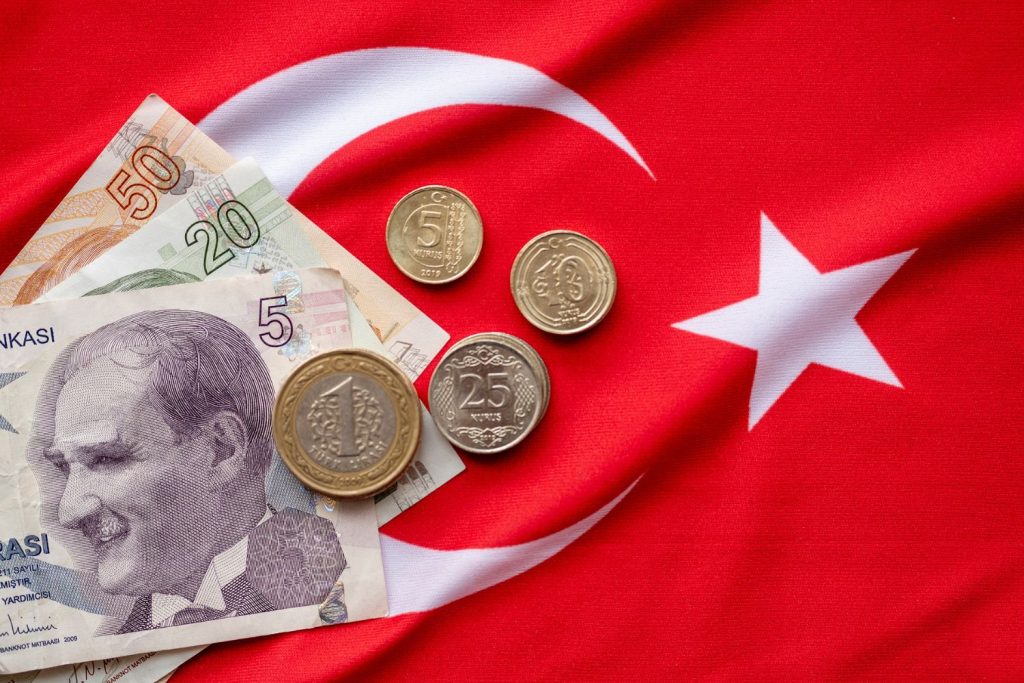
The smaller kuruş are rarely used and often even discarded in the current economic crisis as they are worth less than a penny.
If you are curious about the exchange rate, I usually use the XE currency converter for the most up-to-date information.
While you can exchange money at a stand, I have often found it much easier to just pull directly from an ATM from my bank back in the States.
It is especially good if you have zero ATM fees like I do with my credit union. Make sure to check before you go!
You can also get a Wise account that will come with a free debit card that can be used internationally with low to zero fees. This makes traveling a breeze.
Emergency Numbers
Above I shared that 112 is for emergency but here is a graphic for the other necessary numbers.
If you need to get a hold of the Tourism Police you can call +90 (212) 527 45 03.
For tourism information use 170.
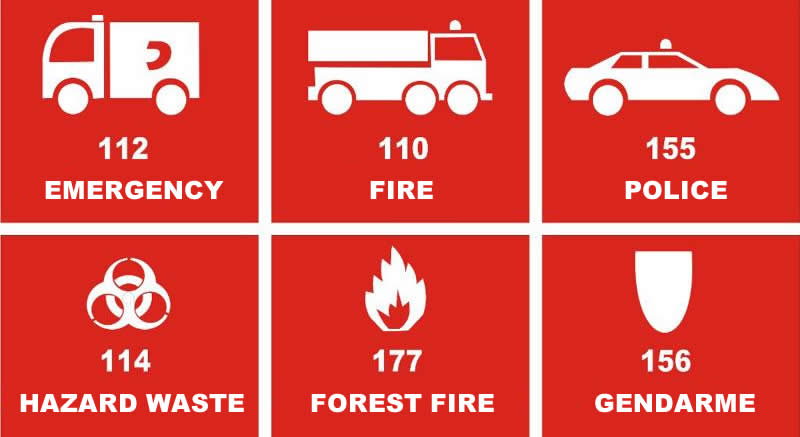
Turkey is famous for
When you hear Türkiye, what do you think of it? I think of Turkish lamps, Hagia Sophia, and baklava.

That being said there is so much more that it is famous for! There are things like:
- Blue Mosque
- Topkapi Palace
- Bosporus Bridge
- Döner kebab
- Turkish Coffee
- the Evil eye
- Turkish carpets
- Hamams (Turkish Bath Houses)
- Hot air balloon rides in Cappadocia
- Mount Ararat: a potential resting place for Noah’s Ark
- 7 Churches of Revelation
- Temple of Artemis in Ephesus – one of the seven ancient wonders of the world
If you’re interested in doing a tour so you hit all the spots in the best order and get all the history without hours of boring audio guides check out my Private Istanbul Guides post.
Neighboring countries to Turkey
Turkey is surrounded by 8 countries, some just barely touching.
They are Armenia, Azerbaijan, Bulgaria, Georgia, Greece, Iran, Iraq, and Syria.
As in any relationship, the depth of the relationship between each one varies drastically and for a variety of reasons.
You can read more about the countries that are near Turkey here.
Frequently Asked Questions about TÜRKİYE
Is Turkey a European Country?
Though part of Turkey is on the European continent and borders two EU countries, Turkey itself is not technically a part of the EU though in recent history it applied to become a part.
Is Turkey in the Middle East or Europe?
Technically it is a non-Arab Middle Eastern country though this is quite debated. As someone who lives here, however, it doesn’t feel Middle Eastern. Turkey plays an important role in its relations with Europe, the Middle East, and Central Asia.
What ethnicity are Turkish people?
They are the Turkic ethnic group. Turks make up the world’s largest Turkic ethnic group. They speak Turkish though there are a variety of dialects.
Final Thoughts on Turkey
Many people consider Turkey to be both geographically and culturally diverse.
There are a couple of different conversations that are often mixed together. You have the geographical question of which continent is it on and you have the what grouping of countries it belongs to.
If you have done any research on your trip to Turkey, you will see that bloggers place it in European, Asian, and Middle Eastern categories across their websites.
The problem is I don’t think the world agrees. WHO and the UN categorize it as part of the European Region while WIKIPEDIA and its many sources categorize it as the Middle East. To be fair, the UN doesn’t have a Middle East option.
This is still hotly debated and seems to be constantly changing. So if it seems confusing, it is because the world is confused about what “Middle East” actually means as well.
Read More:
- Looking to take a short trip to Cyprus from here?
- Read more on the national flower of Turkey
- Things that are great to do in Spring in Istanbul
- 11 one-day trips to escape the chaos of Istanbul
- Thinking about living in Turkey? Check out the cost of living
Turkey Vacation Basics
When I plan a trip these are the websites I use. I hope they help you plan your next adventure as well!
FLIGHTS: I am a huge fan of Skyscanner and WayAway.
VISAS: You can use the free e-visa portal here but for a few extra dollars you can use iVisa and someone else will handle any issues that may come up.
E-SIM: When I traveled to SE Asia I discovered e-sims and I’m never going back. Airalo has been easy and cheap!
TRAVEL INSURANCE: I use TravelInsurance.com for my trips abroad.
CAR RENTAL: I have loved working with Discover Cars when I rent cars in country.
AIRPORT TRANSFERS: I have used these transfers many times and they are always great. If you’d like more options, I also recommend GetTransfers.com as they allow you to compare companies.
ACCOMMODATION: Find the best Turkey hotel deals on Booking.com.
CITY TOURS & DAY TRIPS: You can browse GetYourGuide’s website to find just the tour you’re looking for! We also recommend the MegaPass for major cities.
Turkey Vacation Basics
When I plan a trip these are the websites I use. I hope they help you plan your next adventure as well!
FLIGHTS: I am a huge fan of Skyscanner and WayAway.
VISAS: You can use the free e-visa portal here but for a few extra dollars you can use iVisa and someone else will handle any issues that may come up.
E-SIM: When I traveled to SE Asia I discovered e-sims and I’m never going back. Airalo has been easy and cheap!
TRAVEL INSURANCE: I use TravelInsurance.com for my trips abroad.
CAR RENTAL: I have loved working with Discover Cars when I rent cars in country.
AIRPORT TRANSFERS: I have used these transfers many times and they are always great. If you’d like more options, I also recommend GetTransfers.com as they allow you to compare companies.
ACCOMMODATION: Find the best Turkey hotel deals on Booking.com.
CITY TOURS & DAY TRIPS: You can browse GetYourGuide’s website to find just the tour you’re looking for! We also recommend the MegaPass for major cities.
